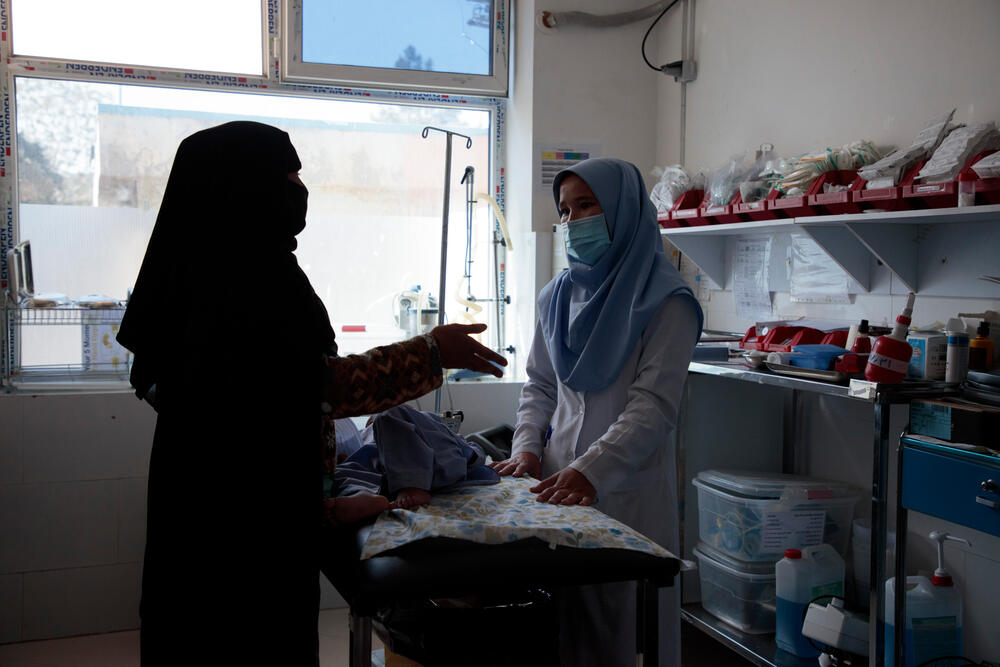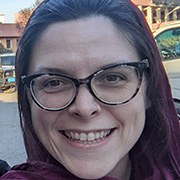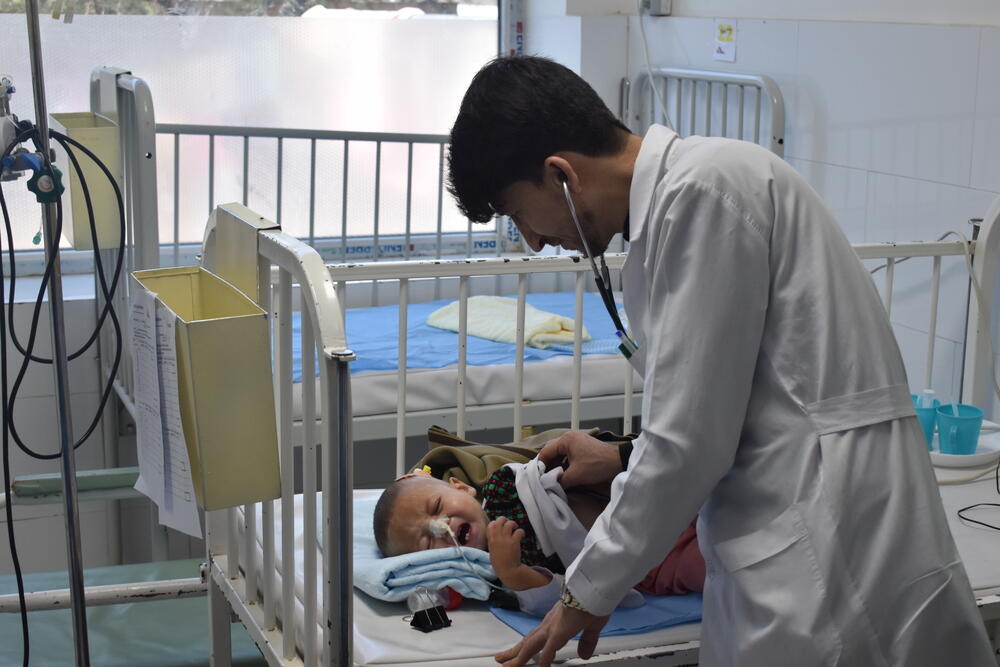Afghanistan: “It all starts with a simple ABCDE”
At a newly opened emergency unit in Herat, Afghanistan, MSF nurse Rebecca is training a team to triage more than 400 patients a day...
When I ran from triage to the red zone with our first emergency patient to put them onto the resuscitation bed, the nurse working there immediately started checking “ABCDE”.
This is airway, breathing, circulation, disability, level of consciousness and exposure – the formal assessment of every patient.
With a moment of pride, I thought back to our days in the classroom: first with the whiteboard and the team calling out answers to my questions, then with the plastic mannequin – imagining we had someone’s son or daughter in front of us – and I saw all the work click into place.
“The nurse squeezed the ambu-bag and gently inflated the baby’s lungs. One, two, three, four, five.”
I’m a paediatric training nurse and I arrived in the city of Herat, in the west of Afghanistan, in October 2021.
I spent three weeks training a new group of nurses and nurse assistants before we opened the new paediatric emergency room (ER) and intensive care unit (ICU).
Expanding emergency care
Our training covered all the basics of triage (the process of deciding how sick a patient is), as well as the assessment and care of sick children in preparation for our first real patients.
We taught the different staff – doctors, nurses and nurse assistants – to work together as a slick team, recognising those children who need immediate life-saving treatment and how to intervene.
Since opening on 10 December, we have treated more than 1,485 patients in our ER, mostly for respiratory tract infections, abdominal pain, convulsions, and acute watery diarrhoea.
On average, we triage more than 400 patients every day.
The service was previously run by the Ministry of Public Health, with small consultation rooms, limited access to medications and not nearly enough doctors and nurses to consult with patients.
There was no existing triage to assess the most critical patients and ensure they were seen with priority… so people would often die waiting for medical care.
MSF has refurbished the existing buildings and added containers to create more space to assess and treat people. We have also implemented a triage process to get those emergency cases to the ER urgently and reduce the risk of people dying by providing life-saving interventions.
And, our patients receive consultations and medications for free, regardless of who they are, or where they have come from – a key MSF principle.
Starting with ABCDE
On the hospital’s opening morning, I saw every member of the nursing team meeting patients with a smile hiding behind their masks and starting the ABCDE checklist.
A small baby only three months old was referred from a clinic a whole day’s travel away. Pulling back the thick blanket wrapping the baby, we saw he was blue and floppy.
The nurse laid the baby onto the resuscitation table and began the assessment: “Airway: no obstruction. Breathing: The baby is not breathing!”
The team sprang into action, calling for extra help. The other nurse assembled what’s known as an Ambu bag and mask to deliver breaths and oxygen to the baby, at the same time the doctor assessed the heart rate with his stethoscope on the baby’s tiny chest.
The nurse squeezed the ambu-bag and gently inflated the baby’s lungs.
One, two, three, four, five.
The doctor reported a good heart rate, and, as he lifted his stethoscope off the chest, we saw the baby start to take his own breaths. Colour returning to his skin, blue to pink.
“Winter has arrived here in Afghanistan. We expect even larger numbers of patients daily with everything from a mild cold and flu to serious respiratory illnesses and more.”
The mother was watching our efforts anxiously and the doctor informed her the baby was improving and breathing without our help. Relief spread across her face and with gentle encouragement she came to hold the hand of her baby.
It was a nice moment for the team. Often, patients arrive too late for our help and despite our best efforts, we don’t see them take their own breaths ever again.
The arrival of winter
Winter has arrived here in Afghanistan. We expect even larger numbers of patients daily with everything from a mild cold and flu to serious respiratory illnesses and more.
Millions of Afghan children live in simple structures that are difficult to keep warm – even if their families can afford fuel. Large families live in small spaces which are perfect places for disease to spread and with no opportunity to isolate the sick.
Food insecurity leads to poor diets, lacking in essential vitamins and minerals – this no doubt contributes to children becoming sick. The malnutrition centre run by MSF next door is still full to the brim with patients, even after the usual peak malnutrition season here has passed.
In numbers: Our work in Afghanistan
458,800
EMERGENCY ROOM ADMISSIONS IN AFGHANISTAN IN 2024
45,000
BIRTHS ASSISTED BY MSF STAFF IN AFGHANISTAN IN 2024
18,100
SURGICAL INTERVENTIONS IN AFGHANISTAN IN 2024
After opening the new ER and ICU, we can already see the road ahead will be challenging.
We are one of the only hospitals able to provide free emergency care to a large population. This includes people both in the city and in the camps for displaced people on the outskirts, as well as people who travel to us from other provinces.
Some people here have almost nothing and have travelled from their villages to find work. They don’t have access to food and water, and they cannot find these basic human needs at home.
Forty years of war seems to have finally reached a tentative end in Afghanistan, but people still suffer the consequence of those years of conflict.
This is my second time working in Afghanistan, and the resilience and strength of the staff, as well as their determination to do everything to the absolute highest standards, drew me back here.
The team here have amazing motivation and are a joy to teach. We will continue training them throughout my time here, and also work to empower the Afghan supervisors to continue training staff and to prioritise education and development.
I believe they will ensure the new service runs full steam ahead, providing world-class emergency care where it is needed the most.
It all starts with a simple ABCDE.


